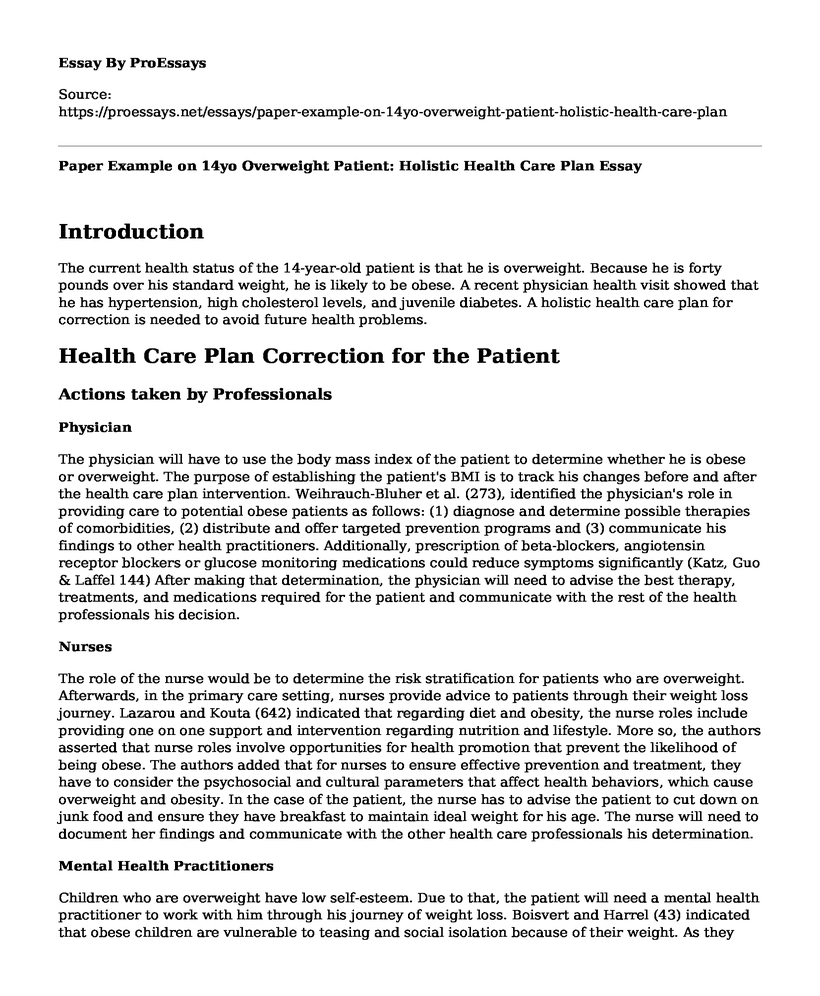Introduction
The current health status of the 14-year-old patient is that he is overweight. Because he is forty pounds over his standard weight, he is likely to be obese. A recent physician health visit showed that he has hypertension, high cholesterol levels, and juvenile diabetes. A holistic health care plan for correction is needed to avoid future health problems.
Health Care Plan Correction for the Patient
Actions taken by Professionals
Physician
The physician will have to use the body mass index of the patient to determine whether he is obese or overweight. The purpose of establishing the patient's BMI is to track his changes before and after the health care plan intervention. Weihrauch-Bluher et al. (273), identified the physician's role in providing care to potential obese patients as follows: (1) diagnose and determine possible therapies of comorbidities, (2) distribute and offer targeted prevention programs and (3) communicate his findings to other health practitioners. Additionally, prescription of beta-blockers, angiotensin receptor blockers or glucose monitoring medications could reduce symptoms significantly (Katz, Guo & Laffel 144) After making that determination, the physician will need to advise the best therapy, treatments, and medications required for the patient and communicate with the rest of the health professionals his decision.
Nurses
The role of the nurse would be to determine the risk stratification for patients who are overweight. Afterwards, in the primary care setting, nurses provide advice to patients through their weight loss journey. Lazarou and Kouta (642) indicated that regarding diet and obesity, the nurse roles include providing one on one support and intervention regarding nutrition and lifestyle. More so, the authors asserted that nurse roles involve opportunities for health promotion that prevent the likelihood of being obese. The authors added that for nurses to ensure effective prevention and treatment, they have to consider the psychosocial and cultural parameters that affect health behaviors, which cause overweight and obesity. In the case of the patient, the nurse has to advise the patient to cut down on junk food and ensure they have breakfast to maintain ideal weight for his age. The nurse will need to document her findings and communicate with the other health care professionals his determination.
Mental Health Practitioners
Children who are overweight have low self-esteem. Due to that, the patient will need a mental health practitioner to work with him through his journey of weight loss. Boisvert and Harrel (43) indicated that obese children are vulnerable to teasing and social isolation because of their weight. As they added, in adolescents, weight gain causes mental health issues such as depression, embarrassment, and depressive symptoms. Also, the authors affirmed that depressive symptoms have a link to sedentary behaviors. Playing video games all day may help the patient overcome his feelings of shame related to his weight. A mental health practitioner will need to assess his overall mental health status and see whether symptoms such as depression and depressive disorders exist, in addition to providing care on his journey towards weight loss.
Nutritionists
The role of the nutritionist would be to advise the patient on a meal plan that would ensure he maintains an appropriate weight for his age. Lazarou and Kouta (648) discuss the nutritional elements required in the health care plan of patients who are overweight. The authors assert that the nutritionist needs to advise their patients to reduce their fat intake to maintain the recommended weight for their age. More so, the authors indicated that nutritionists should advice the patient to consume low carbohydrates because they provide protection against the accumulation of fat and increase weight loss (Lazarou and Kouta 649). Additionally, the nutritionist should advise the patient to take more proteins of at least 20% to increase their energy balance and maintain weight loss in the long-run (649). More so, the authors stated that consuming calories of 50 or less in a sitting would increase energy and promote weight loss. More so, dietary fiber and increase in water consumption increases fullness and prevents someone from overeating. Nutritionists will need to meet with patients regularly and explain their dietary requirements that could facilitate weight loss, as well as provide them with a meal plan chart to follow as part of a weight regain plan in order to get back within their proper age group.
Works Cited
Boisvert, Jennifer A, and W Andrew Harrell. "Integrative treatment of pediatric obesity: psychological and spiritual considerations." Integrative medicine (Encinitas, Calif), vol. 14,1 (2015): 40-7.
Katz, Michael et al. "Management of hypertension and high low-density lipoprotein in pediatric type 1 diabetes." The Journal of Pediatrics, volume197, (2018): 140-166
Lazarou, Chrystalleni, and Kouta, Christiana. "The role of nurses in the prevention and management of obesity." British Journal of Nursing, Volume 19, No 10, (2010): 641-647.
Weihrauch-Bluher et al. "Current guidelines for obesity prevention in childhood and adolescence." Obesity Facts, volume11 (2018): 263-276
Cite this page
Paper Example on 14yo Overweight Patient: Holistic Health Care Plan. (2023, May 03). Retrieved from https://proessays.net/essays/paper-example-on-14yo-overweight-patient-holistic-health-care-plan
If you are the original author of this essay and no longer wish to have it published on the ProEssays website, please click below to request its removal:
- Why Women and Men Still Can't Have It All?
- Essay Sample on de Beauvoir's Hope for Women
- Native Americans: Migration to Urban Areas Over Last 4 Decades - Essay Sample
- Immigrants Struggle: Discrimination, Deportation & Hate Crimes - Essay Sample
- Childhood Obesity: A Growing Health Crisis in the US - Essay Sample
- Media and Racism: 40 Years of Discrimination - Essay Sample
- Free Report Example on Bullying: A Global Threat Needing Immediate Intervention







